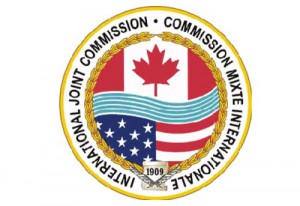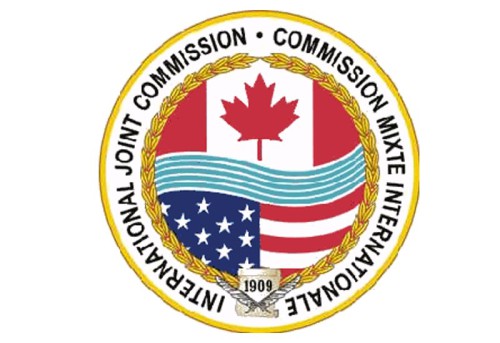by Robin Burridge with files from Alicia McCutcheon
LITTLE CURRENT—When the estimated 300 Manitoulin residents turned out last Sunday (July 15) to both participate in and observe the presentations to the full board of the International Joint Commission (IJC) on dropping Lake Huron water levels, some themes caught fire and were clearly representative of the feelings and frustrations of the entire Island group.
One of these themes was the impact on the endangered St. Clair River sturgeon population. The group on Sunday met to respond to the IJC on a recently-released report of low water issues and the recommendations contained in the report on the topic.
The report, prepared for the IJC by the International Upper Great Lakes Study Board (IUGLSB), makes what is generally seen as its primary recommendation the option of doing nothing to mitigate the Lake Huron outflow through the St. Clair Rive and into Lake Erie.
One of the reasons against man-made intervention as cited in the report, titled “Lake Superior Regulation: Addressing Great Lakes water levels” is because slowing down the water outflow rate in the St. Clair River might negatively impact its sturgeon population.
As reported previously, when it came to the study of Lakes Huron and Michigan, the IUGLSB chose to focus, at the direction of the International Joint Commission, on “the feasibility and implications of raising water levels by means of restoration structures in the St. Clair River to compensate for past natural and human-induced changes,” the study states.
The study considered restoration structures including sills and underwater hydroelectric turbines that could be placed in the St. Clair River to slow Lake Huron’s outflow and would come at a cost of between $30 and $170 million and could upset the natural spawning grounds of the endangered lake sturgeon. It would also take upwards of 20 years for such a commitment to take place. The study states that while restoration would increase water levels at low points in Lakes Huron and Michigan, it would also mean raising the levels to an “extreme high” in southern ports of the same lakes.
The Study Board, through its March 2012 report, recommended against this kind of remediation in the St. Clair River and one of the reasons given—the possible threat to the sturgeon population native to the St. Clair—proved to be very much a hot-button issue for many of the presenters at Sunday’s IJC hearing.
“The study addresses the sturgeon of the St. Clair River, but what about our sturgeon?” asked Mary Ellen Shain, project coordinator for the MASC. “We must also look at them in equal measure. I cannot understand how the St. Clair sturgeon trumps Huron sturgeon.”
Northeast Town Councillor Christina Jones also expressed concern for Lake Huron’s sturgeon and its general population of all fish species.
“My great-grandson is sixth generation,” began Ms. Jones. “I used to take my children to see the spawning beds (at the pond in Baie Fine), but now they are all gone. My great-grandson and future generations of my family will never get the experience my children had.”
“We are losing spawning grounds,” stated Rick Gjos, representing the Little Current Fish and Game Club. “The Strawberry Channel used to have a high pike population, but we have noticed over the years that the population has deteriorated significantly, as have the traditional spawning shoals. The fish just can’t access the culverts in the Sheguiandah Bay area they once could. The drop in Lake Huron’s water level is affecting local fisheries and causing significant drops in our tourism. Over the last number of years, many resorts have closed.”
“Over the last 11 years, we have seen drastic changes to our streams and around Manitoulin Island,” said Seija Deschenes, Manitoulin Streams program coordinator. “Manitoulin Island has a sport finishing industry that grosses $9 million and has an economic spin off of almost three times that much and there are over 50 resorts on this Island that depend on the health of our fisheries. Why did the Study Board recommend doing nothing? I really encourage you to do something. Please, our economy and fish habitat are dependant on your action.”
In the study the Manitoulin edition of the series of IJC meetings was responding to, adaptive management was recognized by the IUGLSB as “having an important role to play” through six initiatives: strengthening hydroclimatic monitoring and modeling; ongoing risk assessment; ensuring more comprehensive information management and outreach; improving tools and processes for decision makers to evaluate their actions; establishing a collaborative regional adaptive management study for addressing water level extremes; and promoting the integration of water quality and quantity modeling and activities.
Following the series of thoughtful and often lively presentations, Manitoulin Area Stewardship Council (MASC), the organization that had pushed the IJC for an Island hearing, commented that, “We are still waiting for a final headcount from the IJC, but we are estimating upwards of 300 individuals came out.”
Ms. Trainor said MASC was thrilled with the turnout of Sunday’s meeting and the local comments on the Study Board’s report the commissioners were able to hear.
“It was a great success,” Ms. Trainor told The Expositor. “We worked really hard to get the hearing and we were delighted at how many people came out and the over three hours of testimonies that were presented.”
Starting at 1 pm, the IJC presented a slideshow that explained its purpose and the main points highlighted in the water level report currently under review. Following the presentation, the commissioners heard presentations from over 35 Manitoulin residents.
Testimonies varied from shoreline residents discussing increasing issues with their waterlines, to Island municipal representatives speaking out about effects in their communities, to First Nations spokespersons highlighting the report’s lack of aboriginal input. A common theme, however, tied the majority of the testimonies together—the need for something to be done.
“This has been studied to death—we need to jump into action,” stated Algoma-Manitoulin MPP Mike Mantha during his address Sunday. His opening comment to this effect was followed by audience applause in agreement. “Taking no action, as the study suggests, is not an option. We need to do something now.”
Jim Nies, MASC member and seasonal resident of Kagawong, expressed similar sentiments in his address to the commission.
“I spent weeks carefully studying the Study Board’s report,” said Mr. Nies. “As I read it, I felt sicker and sicker to my stomach. The study seems to ignore the problem of Huron/Michigan, and instead simply focuses on the St. Clair River. We need action now. I think we should be operating in a state of emergency and do everything possible to save our lakes.”
“I realize this is not your report—this is just a report for you to accept or reject,” said Ted Cowan, who introduced himself as the co-president of the Bay of Islands Association. “Considering that the study was done by mostly all university professors, he joked, tongue-in-cheek, it’s unusual that they suggest no more studies, and it’s heartbreaking that the study recommends no action.” Mr. Cowan also reiterated that the issue of Lake Huron is ignored in the study and recommended that the IJC reject the study.
Little Current Mayor Joe Chapman added his thoughts as well, stating that, “we realize that you didn’t write the report, but that your job is to review it. We accept the recommendations for Lake Superior, but we respectfully reject the submission in its entirety that nothing be done. It is completely unacceptable. The interests of those in Montreal should not be superior to those in Northern Ontario.”
Concluding the numerous submissions, Iana Pollack, a commissioner of the IJC, spoke, thanking Island residents for their input and encouraging those who did not speak to submit their comments prior to August 31.
“I hope you all can respect that our lives are full and busy too, but we are here because we take this very seriously,” said Ms. Pollack. “We have the authority to make the kind of changes recommended, but on all other matters, we personally don’t have the authority. We do, however, have the responsibility to make recommendations to the US and Canadian governments. We thank you for your thoughts, and encourage you to stay informed and continue to speak out to us and your government.”
Both word documents and pdfs of the study can be uploaded at www.ic.org/iuglsreport and comments will be accepted until August 31, 2012, and can be submitted via the IJC website, email at commission@
ottawa.ijc.org, or in writing to International Joint Commission, 234 Lauier Avenue West, 22nd Floor, Ottawa Ontario, K1P 6K6.




